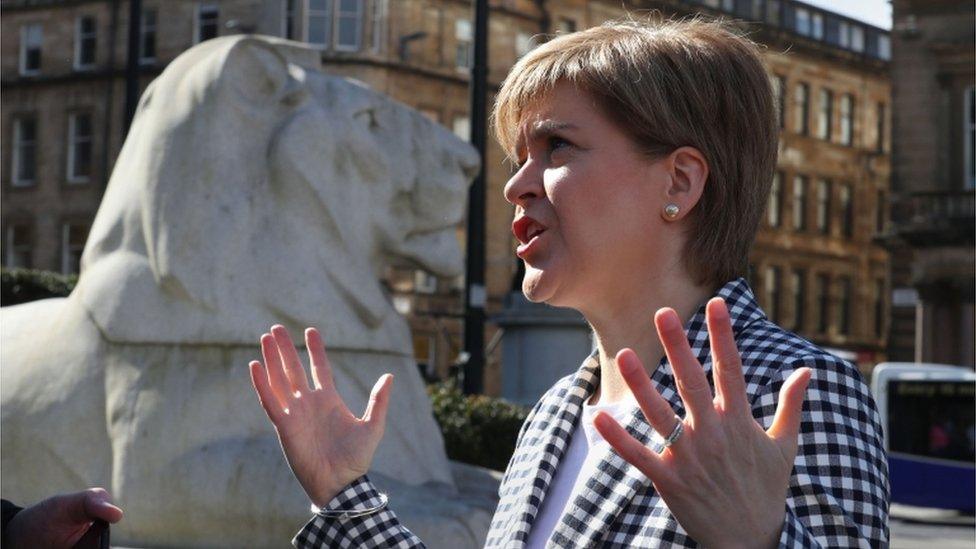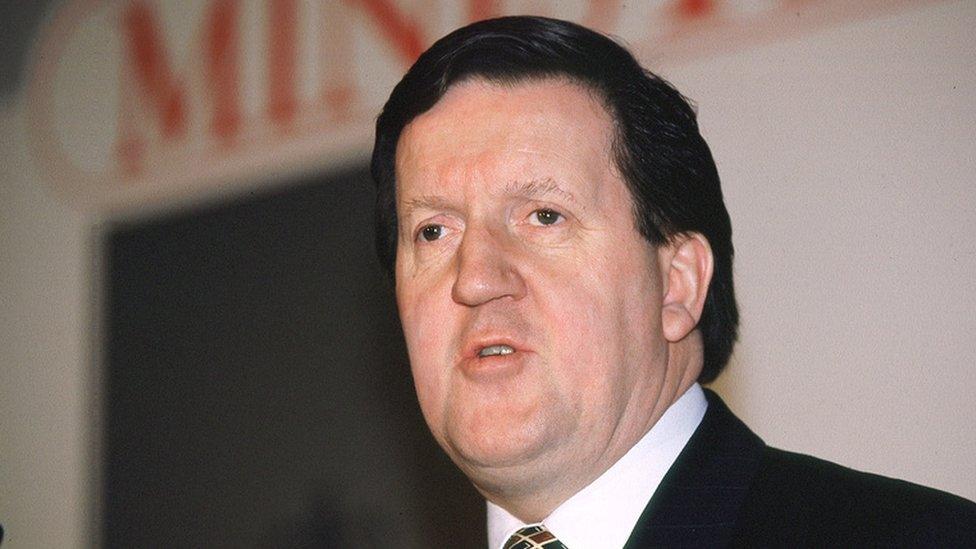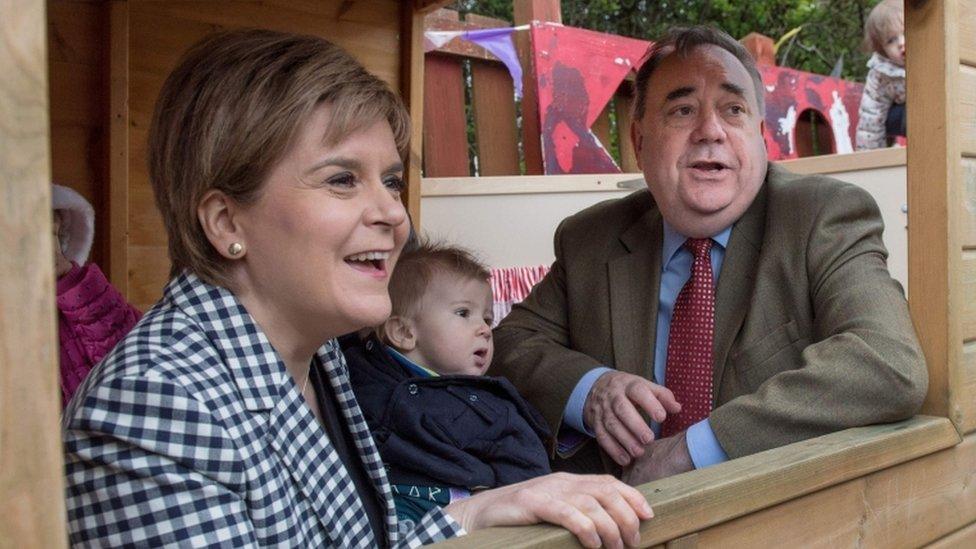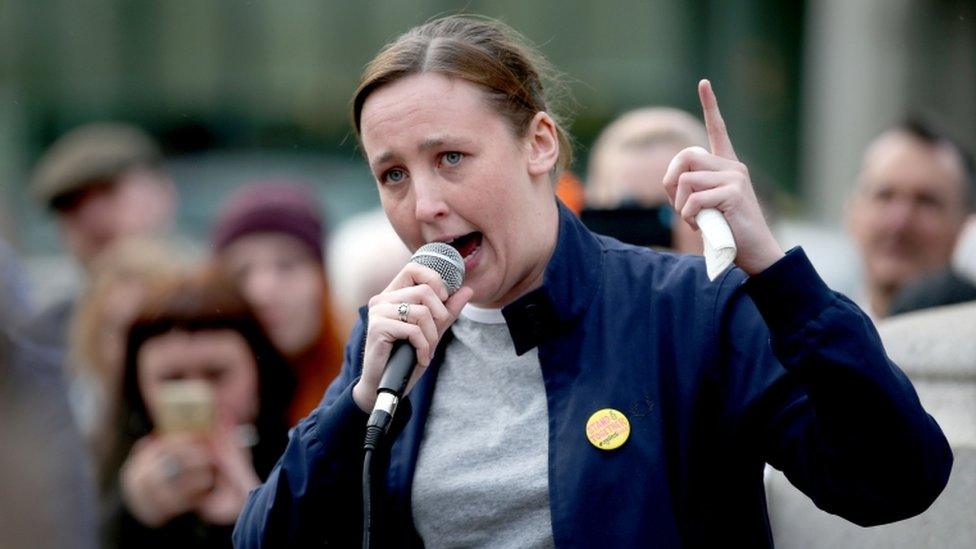Guide to the parties: Scottish National Party
- Published

Nicola Sturgeon became her party's leader following the Scottish independence referendum in September 2014
The Scottish National Party will be hoping for another strong performance following its triumphant showing in 2015. First Minister Nicola Sturgeon knows success is vital if she is to keep up the pressure for a second referendum on Scottish independence.
Potted history:
Founded in 1934, initially pushing for a devolution of powers to Scotland. The party found it hard to make an impact, but grew steadily throughout the 1960s and 1970s. Progress stalled, however, partly due to factional in-fighting.
The election of Alex Salmond to the leadership in 1990 proved significant. The party won six seats in the general election of 1997, and the creation of the Scottish Parliament in 1999 presented an opportunity to become a real political force.

George Robertson was proved wrong when he predicted the death of the SNP
Labour's George Robertson predicted that devolution would "kill the SNP stone dead", but his prediction was proved wrong, and the party won an overall majority at Holyrood in 2011, precipitating the 2014 referendum on Scottish independence - the result of which was 55% against and 45% for.
Where are they now?
The SNP scored a stunning success in the 2015 general election. Just a year after being frustrated by the vote to remain part of the UK, the party nearly swept the board in Scotland, taking 56 of the 59 Scottish parliamentary seats, including 40 out of 41 seats from Labour.
However, the party lost its overall majority at the Scottish Parliament in the 2016 election as the Conservatives made significant advances. As of July 2016, the party had about 120,000 members.
Key players:
Even though she has no seat at Westminster, and will not be running for a seat in the coming election, Scotland's first minister Nicola Sturgeon is the dominant SNP figure in this election campaign.
Her strong performances on the stump, and, in particular during the televised debates in 2015, were credited with the SNP's triumph at the ballot box, with many commentators calling her the most effective political communicator in Britain.
However, critics are concerned that Ms Sturgeon may have over-played her hand by demanding that Theresa May agree to a second referendum on the independence question when the polls suggest there is still a slim majority in Scotland in favour of remaining part of the UK. Mrs May will hope a resounding victory in June will empower her to continue to resist those demands.

Alex Salmond remains an influential figure in the SNP
Ms Sturgeon must also find an answer to critics concerned that Scotland might potentially end up outside both the UK and the European Union.
The previous leader Alex Salmond, from whom Ms Sturgeon took over after the 2014 independence vote, also remains a pugnacious campaigner, and a high-profile figure in the party.
Leader's philosophy in a quote:
"I've not hidden and I'll never hide the fact that I want Scotland to be an independent country. But as long as we're part of the Westminster system, it's really important to people in Scotland that we get good decisions coming out of Westminster. So we've got a vested interest in being a constructive participant."
What the critics say:
"It's the tunnel vision of the Scottish nationalists in focusing only on independence that actually means they are not focusing on the work we need to do to ensure we get that best deal for the people of Scotland and the people of the United Kingdom as well," Theresa May, Prime Minster.
What do they hope to achieve?

Mhairi Black, who became the UK's youngest MP in 2015, has made a splash at Westminster
The SNP objective will be to consolidate the spectacular gains made at the 2015 election. With only three seats in Scotland not already in party hands (independent MPs now sit in two other seats, having resigned the party whip) there is little scope for advance. The priority will be to hold off Ruth Davidson's Conservative Party, which made significant gains in the local elections, and to ensure that Labour remains firmly in the doldrums. The Westminster election will always be of secondary importance to the SNP, whose primary focus is to retain power in the Scottish Parliament.
Strong suit?
The party is ideally placed to take advantage of frustration among Scottish voters that the country is being dragged out of the European Union despite voting decisively in favour of Remain in the referendum in 2016.
Where do they stand on Brexit?
Implacably opposed. Sturgeon's position is that while the European Union is not perfect, Scotland's interests are best served by being a member. The SNP will push for Scotland to have special status if Brexit takes place, and for it to stay a part of the single market, even if the rest of the UK opts to leave.
However, polls consistently suggest about a third of SNP supporters backed Brexit, external, including their former health secretary Alex Neil. The party is conscious that some of its supporters might go cold on independence if it means rejoining the EU, leading to some speculation that it might ditch a policy of full EU membership after independence in favour of a Norway-style free trade arrangement.
Key policies: (Many policy areas are devolved to the Scottish Parliament)
Scotland to have a special status after Brexit, including remaining in the single market.
Opposition to the "rape clause". The restriction of tax credits for any new claimants to a maximum of two children unless a woman can demonstrate a third or subsequent child was a result of rape.